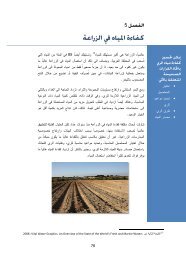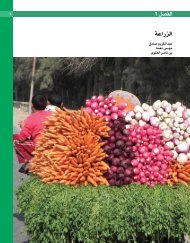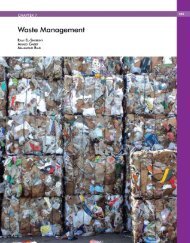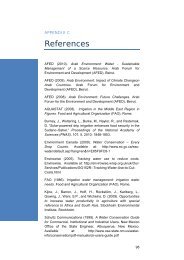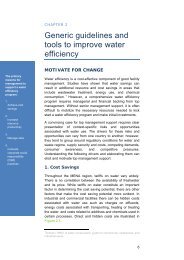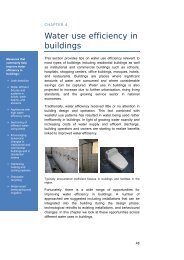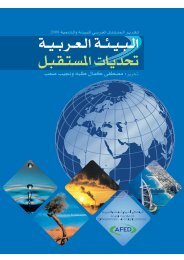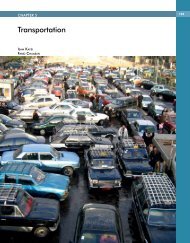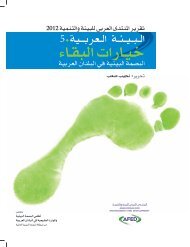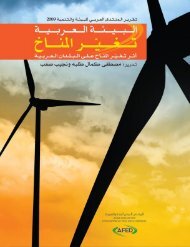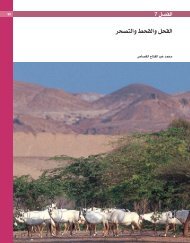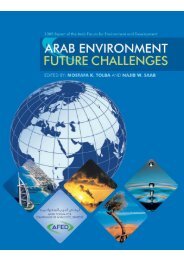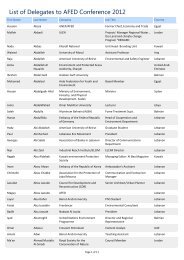Impact of Climate Change on Arab Countries - (IPCC) - Working ...
Impact of Climate Change on Arab Countries - (IPCC) - Working ...
Impact of Climate Change on Arab Countries - (IPCC) - Working ...
Create successful ePaper yourself
Turn your PDF publications into a flip-book with our unique Google optimized e-Paper software.
98<br />
CHAPTER 7<br />
HUMAN HEALTH<br />
ness system require a str<strong>on</strong>g basis <str<strong>on</strong>g>of</str<strong>on</strong>g> training and<br />
capacity building for policy makers, scientists,<br />
and health pr<str<strong>on</strong>g>of</str<strong>on</strong>g>essi<strong>on</strong>als in disaster management,<br />
research, data collecti<strong>on</strong> and m<strong>on</strong>itoring, and<br />
resp<strong>on</strong>se to health emergencies. It also involves<br />
raising awareness am<strong>on</strong>g the general populati<strong>on</strong>,<br />
especially vulnerable populati<strong>on</strong>s.<br />
IV. CONCLUDING REMARKS<br />
Despite the deficiency in both data and research,<br />
there is growing evidence that climate change is<br />
c<strong>on</strong>tributing to the global burden <str<strong>on</strong>g>of</str<strong>on</strong>g> disease in<br />
<strong>Arab</strong> countries. The limited research available has<br />
shown that climate change plays an important<br />
role in the spread <str<strong>on</strong>g>of</str<strong>on</strong>g> vector-borne infectious diseases,<br />
such as malaria and schistosomiasis (Egypt,<br />
Morocco and Sudan), in affecting the seas<strong>on</strong>al<br />
c<strong>on</strong>centrati<strong>on</strong>s <str<strong>on</strong>g>of</str<strong>on</strong>g> some allergens in the atmosphere,<br />
causing allergic reacti<strong>on</strong>s and pulm<strong>on</strong>ary<br />
diseases (Leban<strong>on</strong>, Saudi <strong>Arab</strong>ia and UAE), and<br />
in the worsening <str<strong>on</strong>g>of</str<strong>on</strong>g> the public health impact <str<strong>on</strong>g>of</str<strong>on</strong>g><br />
heat waves especially in <strong>Arab</strong> countries with hot<br />
climates.<br />
Earlier in the chapter, the authors noted that<br />
poorer <strong>Arab</strong> countries currently carry the largest<br />
burden <str<strong>on</strong>g>of</str<strong>on</strong>g> the health impact <str<strong>on</strong>g>of</str<strong>on</strong>g> climate change.<br />
Some may questi<strong>on</strong> the c<strong>on</strong>tributi<strong>on</strong> <str<strong>on</strong>g>of</str<strong>on</strong>g> climate<br />
change to this burden as compared to that <str<strong>on</strong>g>of</str<strong>on</strong>g><br />
poverty and people’s suboptimal living c<strong>on</strong>diti<strong>on</strong>s.<br />
This delineati<strong>on</strong> <str<strong>on</strong>g>of</str<strong>on</strong>g> c<strong>on</strong>tributi<strong>on</strong> might be<br />
an interesting research questi<strong>on</strong> but as far as policy<br />
is c<strong>on</strong>cerned there is enough evidence for<br />
acti<strong>on</strong>-oriented policies to counteract the effects<br />
<str<strong>on</strong>g>of</str<strong>on</strong>g> climate change with special attenti<strong>on</strong> to the<br />
poorer populati<strong>on</strong>s. This is all the more so since<br />
health is central to sustainable development and<br />
to the achievement <str<strong>on</strong>g>of</str<strong>on</strong>g> the Millennium<br />
Development Goals (MDGs). If <strong>Arab</strong> countries<br />
are to achieve the MDGs and counteract the<br />
adverse effects <str<strong>on</strong>g>of</str<strong>on</strong>g> climate change, then various<br />
adaptati<strong>on</strong> strategies, policies and measures need<br />
to be implemented. Reducti<strong>on</strong> in greenhouse gas<br />
(GHG) emissi<strong>on</strong>s through the shift towards<br />
renewable energies and increases in energy efficiency<br />
will yield significant l<strong>on</strong>g term benefits for<br />
human health.<br />
There is no shortage <str<strong>on</strong>g>of</str<strong>on</strong>g> human resources or global<br />
and regi<strong>on</strong>al financial resources in the <strong>Arab</strong><br />
world. What is needed now is the will to act.<br />
REFERENCES<br />
Adam, I., A.H. Khamis, and M.I. Elbashir (2005).<br />
‘Prevalence and risk factors for Plasmodium falciparum<br />
malaria in pregnant women <str<strong>on</strong>g>of</str<strong>on</strong>g> eastern Sudan’.<br />
Malaria Journal 4:18.<br />
Ageep, T.B., J. Cox,, M.M. Hassan, B.G. Knols, M.Q.<br />
Benedict, C.A. Malcolm, A. Babiker, B.B. El Sayed<br />
(2009). ‘Spatial and temporal distributi<strong>on</strong> <str<strong>on</strong>g>of</str<strong>on</strong>g> the<br />
malaria mosquito Anopheles arabiensis in northern<br />
Sudan: influence <str<strong>on</strong>g>of</str<strong>on</strong>g> envir<strong>on</strong>mental factors and implicati<strong>on</strong>s<br />
for vector c<strong>on</strong>trol’. Malaria Journal 8(1):123.<br />
Al-Ajam, M. R., A.R. Bizri, J. Mokhbat, J. Weed<strong>on</strong>,<br />
and L. Lutwick (2005). ‘Short report: Mucormycosis in<br />
the Eastern Mediterranean: A seas<strong>on</strong>al disease’.<br />
Epidemiological Infecti<strong>on</strong> 134(2):341-346.<br />
Al-Frayh, A., S.M. Hasnain, D.J. Wils<strong>on</strong>, and H.A. Harfi<br />
(1988). ‘Fungal Allergens in the atmosphere <str<strong>on</strong>g>of</str<strong>on</strong>g><br />
Riyadh: A preliminary communicati<strong>on</strong>’. Annals <str<strong>on</strong>g>of</str<strong>on</strong>g><br />
Saudi Medicine 8(4):248-251.<br />
Al-Ghuraiz, Y. and A. Enshassi (2006). ‘Customer’s<br />
satisfacti<strong>on</strong> with water supply service in the Gaza<br />
Strip’. Building and Envir<strong>on</strong>ment 41(9):1243-1250.<br />
Al-Mansoob, M.A. and M.M. Al-Mazzah (2005). ‘The<br />
role <str<strong>on</strong>g>of</str<strong>on</strong>g> climate <strong>on</strong> Malaria Incidence Rate in four governorates<br />
<str<strong>on</strong>g>of</str<strong>on</strong>g> Yemen’. Medical Journal <str<strong>on</strong>g>of</str<strong>on</strong>g> Malaysia.<br />
60(3):349-57.<br />
Anwar, W.A. (2003). ‘Envir<strong>on</strong>mental health in Egypt’.<br />
Internati<strong>on</strong>al Journal <str<strong>on</strong>g>of</str<strong>on</strong>g> Hygiene and Envir<strong>on</strong>mental<br />
Health 206(4/5):339-350.<br />
Al-Taiar, A., J. Shabbar, A. Assabri, M. Al-Hobary, A.<br />
Azazy, N. Al-Mahdi, K. Ameen, B.M. Greenwood, and<br />
C.J.M. Whitty (2006). ‘Severe malaria in children in<br />
Yemen: two site observati<strong>on</strong>al study’. BMJ. 333:827<br />
Al-Taiar, A., J. Shabbar, A. Assabri, M. Al-Hobary, A.<br />
Azazy, A. Al-Gabri, M. Al-Ganadi, B. Attal, and C.J.M.<br />
Whitty (2008). ‘Who develops severe malaria- <str<strong>on</strong>g>Impact</str<strong>on</strong>g><br />
<str<strong>on</strong>g>of</str<strong>on</strong>g> access to healthcare, socio-ec<strong>on</strong>omic and envir<strong>on</strong>mental<br />
factors in Yemen: a case-c<strong>on</strong>trol study’.<br />
Tropical Medicine & Internati<strong>on</strong>al Health 13(6):762-<br />
770.<br />
Al-Tawheed, A.R., K.A. Al-Awadi, E.O. Kehinde, H.<br />
Abdul-Halim, A. Al-Hunayan, Y. Ali, A.H. Mohammed<br />
(2003). ‘Anuria sec<strong>on</strong>dary to hot weather-induced



